Form 1 AV Survey Portal Instruction Manual
Grants to States for Access and Visitation
Attachment C_AV Survey Portal Instruction Manual for 2015 PRA
Grants to States for Access and Visitation
OMB: 0970-0204
Office of Child Support Enforcement
Access and Visitation
Access and Visitation
Instruction Manual
Document Version: 1.3
(TBD)
Administration for Children and Families Office of Child Support Enforcement 370 L’Enfant Promenade S.W. Washington, DC 20447
DCN:
This document was prepared for the United States Department of Health and Human Services, Office of Child Support Enforcement under Contract Number HHS-N26-3999-900033I by Lockheed Martin, Information Systems & Global Solutions, Incorporated (LM IS&GS). The work was authorized in compliance with the following specific prime task order:
Delivery Order Number: HHS-P23-3201-175055W Delivery Order Title: Access and Visitation Document Date: TBD
DM v2.8.6
Office of Child Support Enforcement Instruction Manual
Access and Visitation Document Version: 1.2
TABLE OF CONTENTS
Content Verification .......................................... Error! Bookmark not defined. 6.1 State Summary 6-1
A. Frequently Asked Questions..................................................................... A-1
B. Checklist: Avoid Processing Errors ......................................................... B-1
List of Figures and Charts
Figure 2-1: State Details Page 1 (Upper) 2-3
Figure 2-3: State Details Page 2 (Upper) 2-7
Figure 2-4: State Details Page 2 (Lower) 2-9
Figure 2-5: State Details Page 2-11
Figure 3-1: State Spreadsheet – Page 1 3-3
Figure 3-2: State Spreadsheet – Page 2 (Left Side) 3-5
Figure 3-3: State Spreadsheet – Page 2 (Right Side) 3-10
Figure 6-2: Sub Grantee Profile 6-3
Figure 7-2: Survey Submission Confirmation 7-2
Chart 2-1: Allowable Characters 2-1
According to federal statute 42 US.C. 669b, states are required to monitor, evaluate, and report on programs funded through the Access and Visitation Grant Program on an annual basis – in accordance with regulations prescribed by the Secretary of the Department of Health and Human Services (45 CFR 303.109).
All reports will be submitted online via the Access and Visitation (AV) portal on the Federal Parent Locator Service (FPLS).
Annual submission of fiscal year reports is due December 30 of each year that the survey is authorized.
This instructional manual is a how-to guide for state AV portal users for navigating the portal and fulfilling reporting requirements.
After logging into the portal, click the ‘State Details’ tab to report general information about the grant program. For information on the data elements contained in this section, please refer to section 2.2.
The State Details pages automatically pre-populate the most recent submitted content. In other words, text submitted in the previous year will pre-populate on the state details pages the following year. Edit pre-populated text as necessary. If you would like to empty all text boxes, select Clear at the bottom of the page.
To complete the State Details section of the survey, select Save, located on the bottom of each page. It is recommended that you save frequently to avoid losing unsaved work. After all required text boxes are complete and the data on each State Details page is saved, the State Details section status on the Survey Status page will state ‘complete’. The Survey Status page will not state ‘complete’ until all required text boxes are complete and all three pages of the section have been saved. You will be able to make changes to the State Details pages after the Survey Statue page states ‘complete’ and before final submission.
Chart 2-1 shows the allowable characters (fields C, D, E, F, G1, G2, H, I, and J):
-
CHART 2-1: ALLOWABLE CHARACTERS
Name
Character
Period
.
Apostrophe
'
Dollar Sign
$
Question Mark
?
Exclamation Point
!
Open Parenthesis
(
Close Parenthesis
)
Hyphen/Dash
-
Asterisk
*
Right Quotation Mark
’
Semi Colon
;
-
CHART 2-1: ALLOWABLE CHARACTERS
Name
Character
Colon
:
Forward Slash
/
Hash
#
Ampersand
&
No other special characters are allowed.
Type content directly into the text boxes. If copied text contains any unallowable characters, none of the copied text will save.
In 15 minute intervals, the portal will display a pop-up that asks if you want to continue working. Enable your system to allow pop-ups so that you receive this notice. If you do not enable pop- ups, you will not receive this notice and will not be able to indicate that you want to continue working, consequently losing all unsaved work.
Save each page as you work. Press Save at the bottom of each page before pressing Next to proceed.
Note: You do not have to complete any section of the portal in a single session. Save information on the State Details page and return to it later. To save data on the State Details pages, use only allowable characters, do not copy text into the portal, and allow pop-ups.
Note: Text boxes have a 4,000 character limit.
On the State Details page, the state reports:
Fiscal Year Award Information (A)
Services Funded with AV Grant Money (B)
Custody and Visitation Guidelines (C)
State Child Access Program Description (D)
Accomplishments of Program Goals (E)
Summary of State’s Anticipated Program Costs versus Actual Expenses (F)
Parenting Time Increased Description (G1)
Increased Knowledge of Effective Co-Parenting Strategies (G2)
Domestic Violence Safeguards (H)
Monitoring (I)
Supplemental Narrative (J)
Fiscal Year Award Information
Figure 2-1 shows the upper part of the State Details page that contains Fiscal Year Award Information and Services Funded with AV Grant Money (B).
Figure 2-1: State Details Page 1 (Upper)
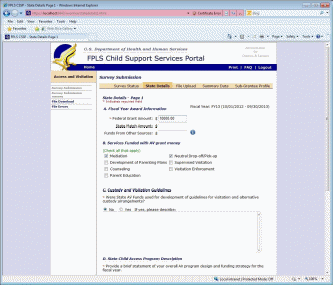
Federal Grant Amount is a required field.
Type in the dollar amount received from the federal grant.
Do not include the dollar sign ($).
Report the actual grant award from the current fiscal year. (Do not report the amount spent.)
State Match Amount or Funds From Other Sources, should not include funds received through the federal grant
Services Funded with AV Grant Money
Select all AV services funded with AV federal grant money.
Do not report services not funded with federal grant money.
Custody and Visitation Guidelines
This is a required field.
In response to the question, select Yes or No.
If the answer is yes, provide response in the text box.
Special characters allowed include period, apostrophe, dollar sign, question mark, exclamation, left and right parenthesis, hyphen, asterisk, right quotation mark, semi colon, colon, forwards slash, hash, and ampersand.
Figure 2-2 shows the section of the State Details page that contains Custody and Visitation Guidelines (C), State Child Access Program Description (D), Accomplishment of Program Goals (E), and the Next button.
Figure 2-2: State Details Page 1 (Lower)
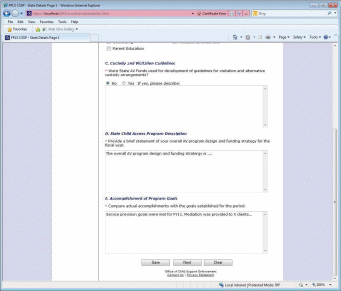
State Child Access Program Description
This is a required field.
In the text box, provide a brief statement of the state’s overall AV program design and funding strategy. Explain how the AV grant program works in your state.
Special characters allowed include period, apostrophe, dollar sign, question mark, exclamation, left and right parenthesis, hyphen, asterisk, right quotation mark, semi colon, colon, forwards slash, hash, and ampersand.
Accomplishment of Program Goals
This is a required field.
In the text box, compare the actual accomplishments with the goals and objectives established for the period in the state’s AV grant application. If applicable, provide the reason that the initial goals and objectives were not achieved.
Special characters allowed include period, apostrophe, dollar sign, question mark, exclamation, left and right parenthesis, hyphen, asterisk, right quotation mark, semi colon, colon, forwards slash, hash, and ampersand.
Figure 2-3 shows the upper sections of the State Details (page 2) containing the Summary of State’s Anticipated Program Costs vs. Actual Expenses (F) and Parenting Time Increased Description (G1).
Figure 2-3: State Details Page 2 (Upper)
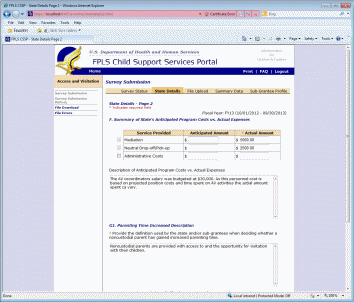
Summary of State’s Anticipated Program Costs vs. Actual Expenses
This is a required field.
Services in this section are pre-populated based on the services selected for Services Provided with AV Grant Money (B) on page 1.
Provide a brief description and comparison of anticipated program costs (reflected in the state’s current AV grant application) with a summary of actual expenses incurred during the grant period. Be sure to only report expenses associated with the federal AV grant money. If the actual cost is unknown, provide the formula used to calculate the estimate.
Special characters allowed include period, apostrophe, dollar sign, question mark, exclamation, left and right parenthesis, hyphen, asterisk, right quotation mark, semi colon, colon, forwards slash, hash, and ampersand.
G1. Parenting Time Increased Description
This is a required field.
Provide the definition used by the state and/or sub-grantee to determine whether the NCP has gained increased parenting time. Provide your state’s and/or sub-grantee’s method for determining whether parenting time has increased. Describe the measure used to determine whether the desired outcome was achieved.
Special characters allowed include period, apostrophe, dollar sign, question mark, exclamation, left and right parenthesis, hyphen, asterisk, right quotation mark, semi colon,
colon, forwards slash, hash, and ampersand.
Fields BR-BS on the state spreadsheet corresponds with this section on the State Details page. (Fields BR-BS reports the number of NCPs who gained increased parenting time due to their participation in federally funded AV services. The totals provided will depend on your state’s definition of success.)
Figure 2-4 shows the lower section of the State Details (page 2) containing Increased Knowledge of Effective Co-Parenting Strategies (G2).
Figure 2-4: State Details Page 2 (Lower)
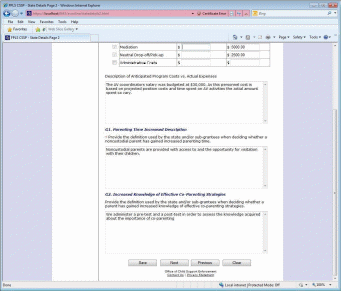
G2. Increased Knowledge of Effective Co-Parenting Strategies
This is an optional field and applies to parent education and/or counseling services only.
Provide the definition used by the state and/or sub-grantee to determine whether a parent has gained increased knowledge of effective co-parenting strategies. Describe the measure used to determine whether the desired outcome was achieved.
Special characters allowed include period, apostrophe, dollar sign, question mark, exclamation, left and right parenthesis, hyphen, asterisk, right quotation mark, semi colon, colon, forwards slash, hash, and ampersand.
Fields BT-BW on the state spreadsheet correspond with this section on the State Details page. (Fields BT-BW report the number of Non-Custodial Parents who gained increased knowledge of Effective Co-Parenting Strategies as a result of their participation in federally funded AV services. The totals provided will depend on your state’s definition of success.)
Figure 2-5 shows an example of the State Details page (page 3) containing Domestic Violence Safeguards (H), Monitoring (I), and Supplemental Narrative (J).
Figure 2-5: State Details Page
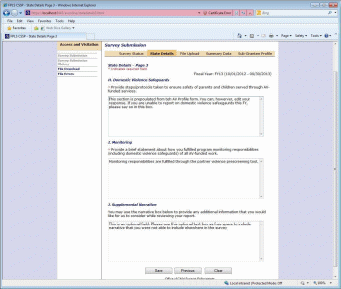
Domestic Violence Safeguard
This field is required.
Briefly describe state measures to ensure the safety of parents and children served through AV federally funded services. Were specific Domestic Violence protocols contractually required of the state and/or sub-grantees? Describe these protocols. Were the protocols effectively implemented?
Special characters allowed include period, apostrophe, dollar sign, question mark, exclamation, left and right parenthesis, hyphen, asterisk, right quotation mark, semi colon, colon, forwards slash, hash, and ampersand.
Monitoring
This field is required.
Briefly describe how the state fulfilled its program monitoring responsibilities of all AV- funded grantees. Briefly describe state measures to ensure that Domestic Violence Safeguards were in place and that protocols were followed?
Special characters allowed include period, apostrophe, dollar sign, question mark, exclamation, left and right parenthesis, hyphen, asterisk, right quotation mark, semi colon, colon, forwards slash, hash, and ampersand.
Supplemental Narrative
This is an optional field.
Use text box as “free space” to include narrative that you were not able to include elsewhere in the survey. Include text that exceeded the allowable character limit in a different narrative text box or provide context for data reported on the spreadsheet.
Special characters allowed include period, apostrophe, dollar sign, question mark, exclamation, left and right parenthesis, hyphen, asterisk, right quotation mark, semi colon, colon, forwards slash, hash, and ampersand.
Note 1: After completing required fields on State Details page 3, click Save. The status of the State Details section on the Survey Status page will state ‘complete’.
Note 2: Make changes to the State Details page any time before survey submission.
Access the correct template of the State Excel Spreadsheet by clicking Sample xls on the File Upload page.
For the correct state spreadsheet, download the state spreadsheet from the “File Upload” page. Click on the “Sample” button.
Do not adjust any margins.
Do not alter the column names or column width. The spreadsheet will not be read by the portal.
Do NOT modify any fields in the header rows (rows 1-3). Added or deleted headers will result in failed file processing.
Upload the state AV file (Microsoft Excel .xls or .xlsx file format) via the AV web application. Files name must adhere to these requirements:
Name format: two letter state abbreviation, period, AV, period, FY and last two digits of the
fiscal year (for example, MD.AV.FY13.)
File name must be equal to or less than 60 characters long.
File name format only include letters, numbers, periods, underscores, and hyphens.
Files submitted on the same day must have unique file names. A suggested approach is to append a date and sequence number to the file name. (For example, MD.AV.FY13.2)
Note: Files names that violate any of these naming requirements will not successfully upload.
When completing the state spreadsheet, adhere to the following formatting requirements:
The third row of an MS Excel spreadsheet (.xls or .xlsx) must contain the Header. The Header includes the names of the fields in the exact order in which they appear on the State MS Excel Spreadsheet. Do not alter, erase, or re-order any Header.
The MS Excel spreadsheet does not allow some characters although those characters may be allowed in the State Details section.
All dates must be in MM/DD/YYYY format (columns I & J).
Only populate the first worksheet of an .xls or .xlsx file. Data on subsequent sheets will not process.
Each state and/or sub-grantee providing AV federally funded services occupy a row on the state MS Excel file.
If a state provides services, enter the information on the first row below the Header (Row 4).
Important Note: Add an extra row for totals. It is recommended to sum the totals to ensure the data will pass all automated quality checks. Some quality checks require equal sums of specific data elements. For example, the sums of Client Referral Source (S-Y), AND Client Information (Z-AD), AND Race/Ethnicity (AP-AX) AND Annual Income (AY-BD) must be equal. It will be helpful to ensure that these totals are equal BEFORE attempting upload. If these totals are not equal, the file will fail this validation. Refer to Section 4.
* If the MS Excel file violates any of these formatting requirements, the MS Excel file will not process successfully.
Please review the instructions for entering the correct data into the state spreadsheet.
Important Note: Using special characters in specific cells can result in unsuccessful processing. Note the description of allowable characters for each data element.
Figure 3-1 shows the state spreadsheet (page 1) containing Name of Grantee and/or Sub-Grantee (A), Title of AV Program (B), Contact Name (C), Address Line 1 (D), City (E), State (F), Zip (G), Grant Amount (H), Grant Period From Date (I), and Grant Period To Date (J)
Figure 3-1: State Spreadsheet – Page 1
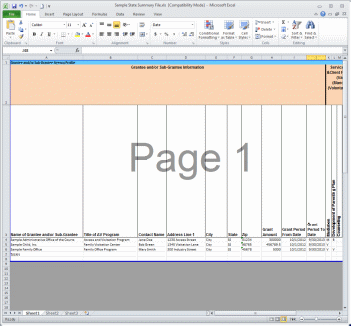
Name of Grantee and/or Sub-Grantee
This field is required.
This field must contain the name of the grantee or sub-grantee that renders AV services with federal grant money.
If the state provides services, provide the information as the first entry on the state spreadsheet (Row 4).
This field can contain the following characters: comma (,), hyphen (-), apostrophe ('), period (.), ampersand (&), and right quotation mark (’).
Title of the AV Program
This field is required.
This field must contain the title of the AV program.
This field can contain the following characters: comma (,), hyphen (-), apostrophe ('), period (.), ampersand (&), and right quotation mark (’).
Contact Name
This field is required.
This field must contain the name of the primary contact of the state and/or sub-grantee.
Contact name format is First Name Last Name.
This field can contain only the following characters: comma (,), hyphen (-), apostrophe ('), period (.), spaces, and right quotation mark (’).
Address Line 1
This field is required.
This field must contain the primary address of the state and/or sub-grantee that renders AV federally funded services.
This field can contain the following special characters: comma (,), hyphen (-), apostrophe ('), hash (#), period (.)
City
This field is required.
This field must contain the city of the grantee or sub-grantee address.
This field must not contain any special characters.
State
This field is required.
This field must contain the two-character abbreviation code for respective state.
This field must not contain any special characters.
Zip
This field is required.
This field must contain the five-digit ZIP code of the state and/or sub-grantee.
The format is xxxxx.
This field must not contain any special characters.
Note: If the zip code begins with zeros, the cell format must be text. Right click on the cell and select Format Cells. Select Text and click OK. After the format is changed, manually re-type the zip code value.
Grant Amount
This field is required.
This field must contain the amount granted to the state and/or sub-grantee.
The field must only contain whole numbers with two decimal places (i.e., xxxxxxxx.xx).
The period is the only special character allowed.
Grant Period From Date
This field is required.
This field must contain the start date of the grant award period granted to the state and/or sub-grantee.
The format is MM/DD/YYYY.
The forward slash is the only special character allowed.
The dates entered for Grant Period From Date and the Grant Period To Date must cover the intended federal fiscal year. Most states report on services provided during the federal fiscal year (e.g., October 1-September 30). If a state has difficulty reporting on services provided during the federal fiscal year and prefers to report services based on the state calendar, contact an OCSE administrator for additional guidance.
Figure 3-2: State Spreadsheet – Page 2 (Left Side)
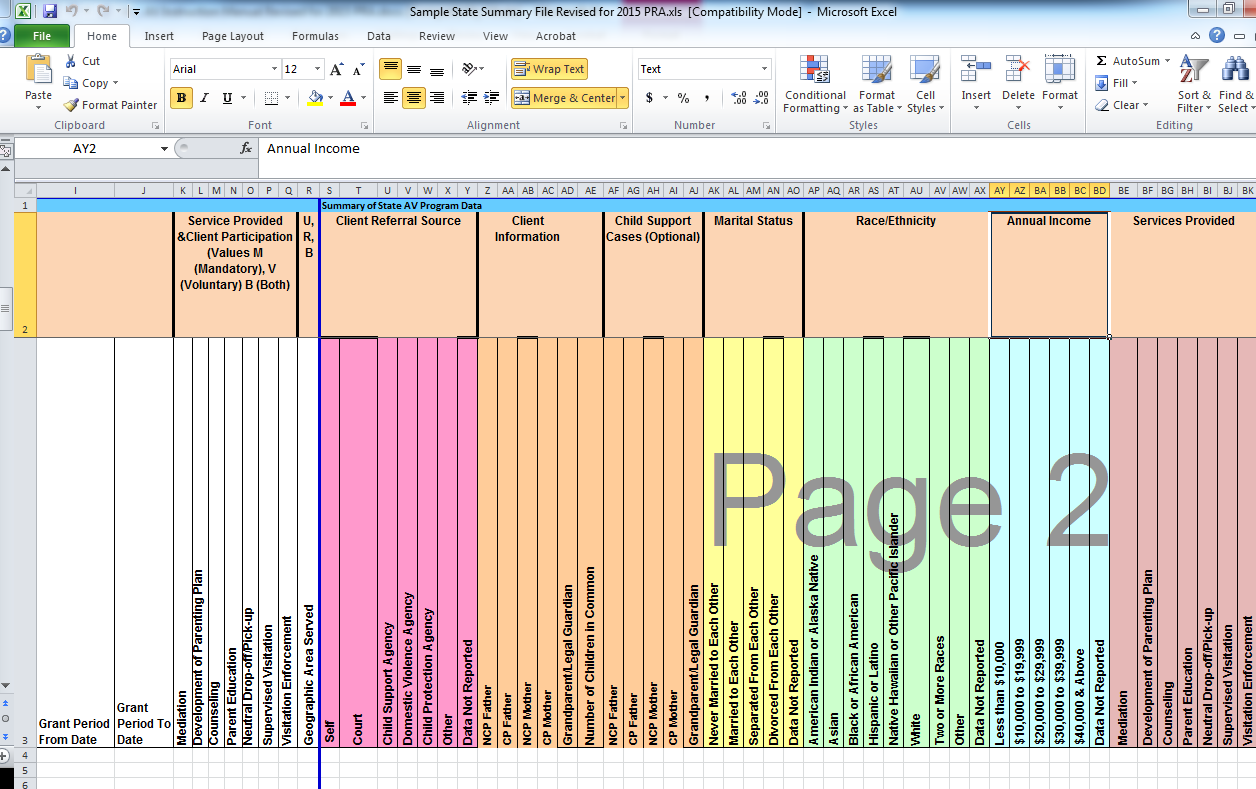
Figure 3-2 shows the State Spreadsheet (page 2) containing Grant Period From Date (I), Grant Period To Date (J), Service Provided (K-Q), Geographic Area Served (R), Client Referral Source (S-Y), Client Information (Z-AE), Child Support Cases (AF-AJ), Marital Status (AK-AO), and Race/Ethnicity (AP-AX).
Grant Period To Date
This field is required.
This field must contain the start date of the grant award period granted to the state and/or sub-grantee.
The format is MM/DD/YYYY.
Forward slashes are the only special characters allowed.
The Grant Period To Date value must be greater than the Grant Period From Date value.
K-Q. Service Provided
These fields are required.
Fields must indicate which service(s) is/are rendered by the grantee and/or sub-grantee and whether client participation is mandatory, voluntary, or both.
At least one service type field must contain a value of either: M (Mandatory), V (Voluntary), and B (Both).
Only populate a field if the grantee or sub-grantee renders the service type.
Blank fields indicate the service was not provided.
There must only be one character per field.
Do not include spaces before or after entries.
R. Geographic Area Served
This field is required.
This field must contain the service area where the grantee or sub-grantee renders the service required.
The valid values are R (Rural), U (Urban), and B (Both).
S-Y. Client Referral Source
These fields are required.
Fields must contain the number of clients participating in AV grant funded services respective of referral type.
The state and/or sub-grantee must report the number of clients who enrolled in the AV program via self-referral, court referral, child support agency referral, domestic violence agency referral, child protection agency referral, other, or data not reported.
Fields must only contain whole numbers.
Fields must not contain any special characters.
Recording tip:
If multiple individuals are part of the same case/reference identifier, report the multiple referrals. The number of Client Referral Sources should equal the number of clients who received services. The total Client Referral Sources should match the same total for Client Information (Z-D), Annual Income (AX-BC), and Race/Ethnicity (AP-AW).
Z-AE. Client Information
These fields are required.
Fields must indicate the number of NCP Fathers, CP Fathers, NCP Mothers, CP Mothers, Grandparents/Legal Guardians, and Children in Common.
Fields must only contain whole numbers.
The field must not contain any special characters.
Recording tip:
If multiple individuals are part of the same case/reference identifier, report the multiple client types. The total for Client Information should match the same total for Client Referral Source (S-Y), Annual Income (AX-BC), and Race/Ethnicity (AP-AW).
AF-AJ. Child Support Cases
These fields are optional.
These fields should indicate the number of clients participating in AV federally funded services with open child support cases.
The state and/or sub-grantee can report the number of clients who are NCP Fathers, CP Fathers, NCP Mothers, CP Mothers, and Grandparents/Legal Guardians and have open child support cases.
Fields must only contain whole numbers.
The field must not contain any special characters.
Recording tip:
If multiple individuals are part of the same case/reference identifier, report each individual involved.
AK-AO. Marital Status
These fields are required.
These fields must contain the number of biological parents served who are Never Married to Each Other, Married to Each Other, Separated from Each Other, Divorced from Each Other, and Data Not Reported.
The total number for marital status should equal the number of biological parents served.
Field must only contain whole numbers.
The field must not contain any special characters.
Recording tip:
If multiple individuals are part of the same case/reference identifier, count the marital status of biological parents twice per case. The total parents for whom Marital Status was recorded should equal the total biological parents recorded (
Z-AC).
AP-AX. Race/Ethnicity
These fields are required.
Fields must specify the number of clients who are American Indian or Alaska Native, Asian, Black or African American, Hispanic or Latino, Native Hawaiian or Pacific Islander, White, Two or More Races, or Data Not Reported.
Field must only contain whole numbers.
Field must not contain any special characters.
Recording tip:
If multiple individuals are part of the same case/reference identifier, enter the various quantities in the Race/Ethnicity fields. The total for Race/Ethnicity should match the same total for Client Referral Source (S-Y), Client Information (Z-D), and Annual Income (AX-BC).
Figure 3-3: State Spreadsheet – Page 2 (Right Side)
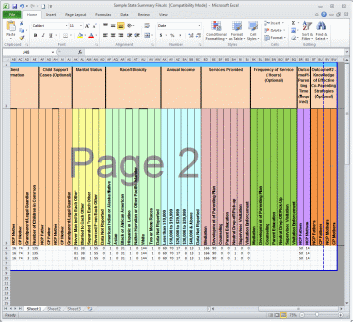
Figure 3-3 shows an example of the state spreadsheet (page 2) containing Annual Income (AY- BD), Service Provided (BE-BK), Frequency of Service (Hours) (Optional) (BL-BR), Outcome
#1-Parenting Time (Required) (BS-BT), and Outcome #2 Knowledge of Effective Co-Parenting Strategies (Optional) (BU-BX).
AY-BD. Annual Income
These fields are required.
Fields must indicate the number of clients who, on an annual basis, earn Less than $10,000,
$10,000 to $19,999, $20,000 to 29,999, $30,000 to $39.999, $40,000 to $39,999, $40,000 &
above, and Data Not Reported.
Field must only contain whole numbers.
Field must not contain any special characters.
The total for Annual Income should match the same total for Client Referral Source (S-Y), Client Information (Z-D), and Race/Ethnicity (AP-AW).
Recording tip:
If multiple individuals are part of the same case/reference identifier, report each person’s income.
BE-BK. Services Provided
These fields are required
Fields must indicate the number of clients receiving the following services: Mediation, Development of Parenting Plan, Counseling, Parent Education, Neutral Drop-Off/Pick-up, Supervised Visitation, and Visitation Enforcement.
Field must only contain whole numbers.
Field must not contain any special characters.
Recording tip:
If multiple individuals are part of the same case/reference identifier, record the services that each person receives. Shared services (i.e., Mediation, Development of Parenting Plan, etc.) should equal the number of individuals receiving those services.
BL-BR. Frequency of Hours
These fields are optional.
Fields must contain the total number of service hours a state and/or sub-grantee reported for each service type.
Field must only contain whole numbers.
Field must not contain any special characters.
BS-BT. Outcome #1-Parenting Time
These fields are required
Fields must contain the number of Non-Custodial Fathers and Mothers who gained increased parenting time as a result of their participation in federally funded AV services.
These fields correspond with field G1 of the State Details section. The definition(s) of success provided in field G1 determines the values provided in the Outcome #1-Parenting Time fields.
Field must only contain whole numbers.
Field must not contain any special characters.
These number values are unique to the state’s definition of success and cannot be compared with any other state.
BU-BX. Outcome #2-Knowledge of Effective Co-Parenting Strategies
These fields are optional.
Fields must contain the number of Non-Custodial Fathers and Mothers who have gained knowledge of effective co-parenting strategies as a result of being provided with Parent Education or Counseling. If there were no Parent Education or Counseling services rendered,
do not provide information in these fields.
This field corresponds with field G2 of the State Details section. The definition of success provided in field G2 determines the values provided in Outcome #2- Knowledge of Effective Co-Parenting Strategies fields.
Fields must only contain whole numbers.
Field must not contain any special characters.
The portal conducts data validations or quality checks on all uploaded files. Several quality checks affect the successful processing of the state spreadsheet. If the state spreadsheet does not pass one or more quality checks, you will receive an email within 5 minutes of the upload which indicates unsuccessful processing and identifies the rows that contain errors.
Some quality checks require that the sums of specific data elements are equal. The specific data elements that are required to be equal are listed in the chart below. To ensure the sums of the data elements listed below are equal, it is recommended that you include a row for totals on your excel file. If the sums of the specific data elements listed below are not equal, the file will not pass quality checks and subsequently, the file will not be processed successfully.
CHART 4-1: QUALITY CHECKS |
|
Quality Check |
Validation |
The totals for Client Referral Source (S-Y), AND Client Information (Z-AD), AND Race/Ethnicity (AP-AW) AND Annual Income (AX-BC) must be equal |
Record the referral source for each individual client served. If one case number/reference identifier represents two clients (i.e., NCP Father and CP Mother), record the two referral sources. |
Service providers should only record clients who receive federally funded AV services. Clients are individuals who directly participate in federally funded AV programs. To determine whether someone is a federally supported AV client, ask, “Would I record them as having received a federally funded AV service type?” If the answer is “Yes”, record the client as such. If the answer is “No”, service providers should report these services on other systems. |
|
Service providers record the race/ethnicity for every client served. |
|
Service providers record the annual income for every client served. |
|
The totals for biological parents (Z-AC) AND Marital Status (AK-AO) must be equal. ***NOTE: this is the sum of NCP Father, CP Father, NCP Mother, and CP Mother constituting the first four columns in Client Information. Grandparents/Legal Guardian SHOULD NOT be included in this total*** |
Record the marital status for every biological parent served. DO NOT record the marital status of any Grandparent/Legal Guardian. |
CHART 4-1: QUALITY CHECKS |
|
Quality Check |
Validation |
The totals for Client Information (Z-AD) must be equal to or less than the totals for Services Provided (BD-BJ). |
For every client reported, at least one federally funded service type should also be reported.
Not all persons who encounter AV services become clients. Therefore, record only individuals who receive federally funded AV services. Record at least one service provided to the client.
Remember: Custodial parents can be clients, too! |
A file upload of the state spreadsheet is required for submission to OCSE. States can upload multiple files. However, the most recent uploaded file overwrites previously uploaded files. After the spreadsheet is successfully processed, the data will pre-populate in the Summary Data and Sub-Grantee Profile sections of the portal.
Figure 5-1 shows the File Upload section containing the state file upload options.
Figure 5-1: File Upload Page
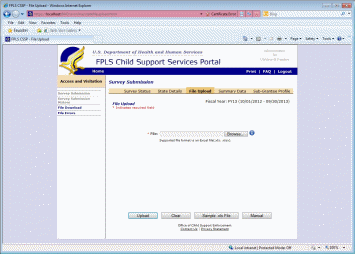
To upload the state spreadsheet, click Browse to access the prepared file. Click on the prepared file and select OK. Once the file name displays in the browse bar, click Upload. After clicking Upload, read the text at the top of the page indicating whether the upload was successful. If the upload was not successful, rename the file so that it satisfies the required name format (refer to section 2.1). If the upload was successful, the system generates an e-mail within 5 minutes to indicate whether the file processed successfully. If the e-mail message indicates that the state spreadsheet processed unsuccessfully, make the recommended revisions and call the AV program administrator if you need assistance. If the e-mail message indicates that the state
spreadsheet processed successfully, the next step in the reporting process is validation of the Summary Data and Sub-Grantee Profile Sections.
CONTENT VERIFICATION
Once the spreadsheet has successfully uploaded, the data pre-populates the Summary Data page. Click the Summary Data tab to view the data.
Review each section on the Summary Data page.
The Domestic Violence Safeguards textbox is the only section on the Summary Data page that pre-populates based on the data entered in field H on State Details page 2. To make changes to the Domestic Violence Safeguards text box, click the State Details tab and edit field H. Save the changes. The Summary Data section will reflect these changes.
Figure 6 -1 shows an example of the Summary Data section.
Figure 6-1: Summary Data
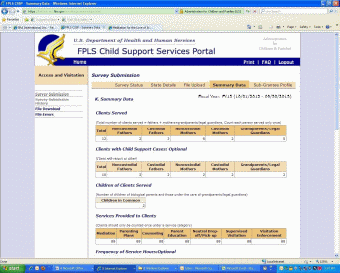
If data looks accurate, click Verify (see Figure 6-2). If data is inaccurate, adjust the state spreadsheet and upload attempt an additional file upload.
After verifying the Summary Data page, the Survey Status table now indicates that both the State Details page and the Summary Data page are complete.
Note: You can make changes to the Summary Data page any time before survey submission. To change the Domestic Violence Safeguards section, make changes to field H on the State Details page. To make changes to all other sections on the Summary Data page, upload a new spreadsheet containing the changes.
A state spreadsheet that has successfully processed pre-populates the Sub-Grantee Profile page. Click on the Sub-Grantee Profile tab to view the totaled data pulled from the state spreadsheet.
Be sure to review all sections on the Sub-Grantee Profile page. Figure 6-2 shows an example of the Sub-Grantee Profile section.
Figure 6-2: Sub Grantee Profile
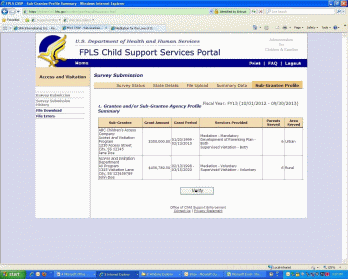
After verifying the accuracy of the information in all sections on the Summary Data page, click
Verify .
The Survey Status table now indicates that the State Details, Summary Data, and Sub-Grantee Profile pages are complete.
Note: Make changes to the Sub-Grantee Profile page any time before survey submission. To make changes, upload a new Microsoft Excel file containing the changes. After uploading the new file, verify both the Summary Data and the Sub-Grantee Profile pages.
Once the State Details, Summary Data, and Sub-Grantee Profile pages are complete, there will be a prompt to submit the survey. When ready, click Submit Survey on the bottom of the Survey Status page.
Figure 7-1 shows the Survey Status page after all survey sections are complete prior to submission.
Figure 7-1: Survey Status
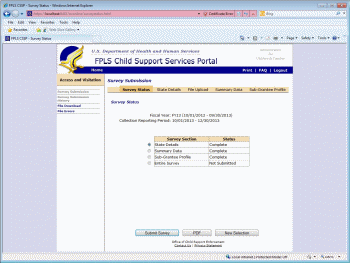
Once submitted, a message verifies the submission (see Figure 7-2). Once submitted, the online survey will no longer be accessible. The reporting process is complete.
Figure 7-2: Survey Submission Confirmation
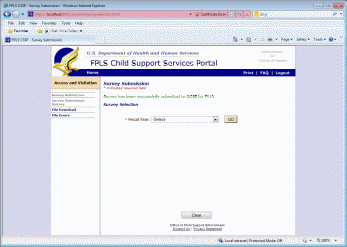
7.2 Survey Returns
If your submitted survey contains any errors, you will receive an email notification which indicates the reason the survey was returned. Returned surveys need to be corrected before resubmitting to OCSE.
Note: When a survey is returned, all survey sections revert to ‘Incomplete’. In order to resubmit the survey, the State Details pages need to be ‘Saved’ again, AND the Summary Data and Sub-Grantee Profile pages also need to be ‘Verified’ again.
If you make revisions to the State Details section, please be sure that you save all three pages of the section. After all required text boxes are complete and the data on each State Details page is saved, the State Details section status on the Survey Status page will read ‘complete’.
If you make revisions to the State Excel Spreadsheet, make sure its content will pass all data checks before uploading the revised file (see Section 4. System Validation). Upload the revised file (see Section 5. Uploading the File) and wait for the email confirmation indicating the status of file processing. The system generates an e-mail within 5 minutes to indicate whether the file processed successfully. If the e-mail message indicates that the state spreadsheet processed successfully, the next step in the reporting process is validation of the Summary Data and Sub- Grantee Profile Sections. Validate the Summary Data and Sub-Grantee Profile Sections by selecting Verify at the bottom of both pages. Once the status of the Summary Data and Sub- Grantee Profile Sections on the Survey Status page state “complete”, you will be prompted to resubmit to OCSE.
Q: Can I access the system from my home computer?
A: No. You can only access the new web-based system through the authorized computer and location assigned to your access.
Q: How do I know when the system has processed my uploaded file successfully?
A: After the system has processed your Microsoft Excel spreadsheet, you will receive an e- mail within 5 minutes to let you know if the upload was successful.
Q: What happens if the system does not process my file successfully?
A: You will receive an e-mail message which indicates that the state spreadsheet did not process successfully. Make the recommended revisions and call the AV program administrator if you need assistance.
Q: How do I view previously uploaded files?
A: To view files:
Click File Download.
Select the appropriate fiscal year.
Click Go to view the upload history.
Q: I uploaded several Microsoft Excel spreadsheets. How do I make sure OCSE receives the intended upload?
A: When you complete the online reporting, the system will submit the most recent upload.
Q: How do I complete the summary data and sub-grantee profile sections?
A: To complete the summary data and sub-grantee profile sections:
Upload your Microsoft Excel spreadsheet. (Once the system processes your file successfully, the summary data and sub-grantee profile sections of the survey populate automatically.)
Click Verify. (The table on the Survey Status page shows that the summary data and sub-grantee profile sections are complete.)

Get your spreadsheet ready for a successful file processing before upload! Each stated must be satisfied in order to pass all data checks. Use this checklist to prepare your file.
 Use
the correct
State
Excel
Spreadsheet
template.
Download
the most updated version
directly
from the
portal
(Refer
to Section 3).
Use
the correct
State
Excel
Spreadsheet
template.
Download
the most updated version
directly
from the
portal
(Refer
to Section 3).
 The
sum of biological
parents
who received
Access
and Visitation services
(rows
Z- AC)
(NCP and
CP mothers
and
fathers)
must EQUAL
the sum of the
marital
status (rows
AK-AO).
The
sum of biological
parents
who received
Access
and Visitation services
(rows
Z- AC)
(NCP and
CP mothers
and
fathers)
must EQUAL
the sum of the
marital
status (rows
AK-AO).
For example, if 75 of the 100 total clients served were biological parents, the sum of the marital status section should total 75.
 The
sum of Client
Information
(Z-AD)
must be equal
to the sum of Client
Referral
Source
(S-Y)
which must be
equal
to the sum of the
Race/Ethnicity
(AP-AW)
entries.
The
sum of Client
Information
(Z-AD)
must be equal
to the sum of Client
Referral
Source
(S-Y)
which must be
equal
to the sum of the
Race/Ethnicity
(AP-AW)
entries.
For example, if the sum of all clients served equals 100, the sum of the client referral sources should equal 100, and the sum of race/ethnicity entries should equal 100.
 Include
a totals
row on the
state spreadsheet
to ensure
that your
file
will pass
all data checks.
Include
a totals
row on the
state spreadsheet
to ensure
that your
file
will pass
all data checks.
 Do
not change
the spreadsheet
margins.
Do
not change
the spreadsheet
margins.
| File Type | application/vnd.openxmlformats-officedocument.wordprocessingml.document |
| File Title | AV Survey Portal Instructions |
| Author | Office of Child Support Enforcement |
| File Modified | 0000-00-00 |
| File Created | 2021-01-24 |
© 2026 OMB.report | Privacy Policy